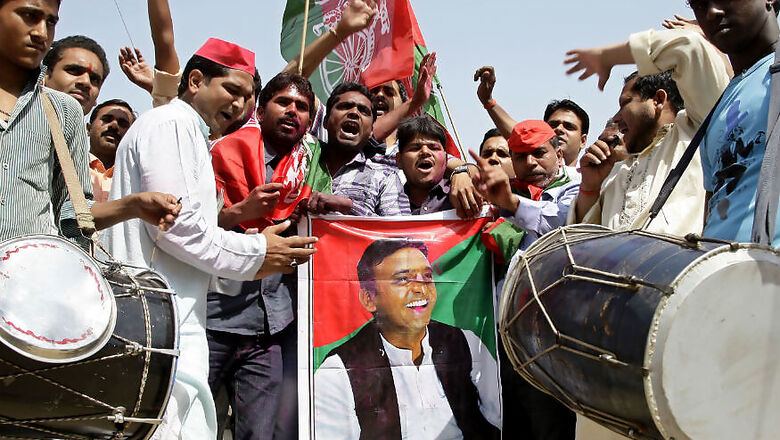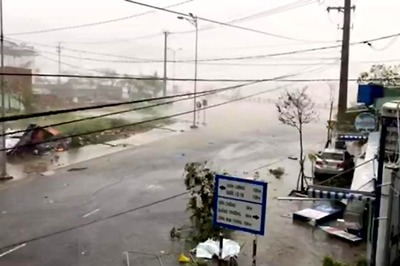
views
Lucknow: The first two phases of polling in western Uttar Pradesh will decide the electoral fortune of several lesser known political parties representing certain castes and sub-castes whose votes become crucial in cow belt politics.
These parties are hitherto less known in the country's political spectrum, but come elections they play a key role as they can decide the prospect of a candidate, especially this time when the stakes are very high.
Some of these caste-based parties are also testing their popularity in eastern Uttar Pradesh, seeking to extend their territory.
Mahila Shashtkikaran Party leaders are raising the issue of women safety which is most talked about in western parts of the state, while Brij Kranti Dal leaders plan to cash in on the sentiments related to Brij Land history and are being seen to have popular acceptance in districts like Mathura and adjoining areas.
While Bhartiya Kisan Union (BKU) is not in the fray this time, there are a number of small parties championing the cause of farmers and helping big parties to garner votes by highlighting their farm policies and promises.
Outfits like Bhartiya Vanchit Samaj Party, Bhartiya Karyastha Sena, Kisan Mazdoor Suraksha Party and Bhartiya Bhaichara Party are toiling hard to make their presence on the state's electoral map.
These parties mostly harp on issues related to the downtrodden sections of the society. Some of these came into existence post Muzaffarnagar riots and talk about communal harmony.
Outfits like little-known Suheldev Bhartiya Samaj Party or Janwadi Party (Socialist), headed by Sanjay Singh Chauhan, matter for mainstream political parties like BJP and Congress because of the support they enjoy among certain castes.
The Paschimi Uttar Pradesh Vikas Party is raising the issues that have not been touched upon by major parties.
Apna Dal headed by Union minister Anupriya Patel is already an NDA ally, is contesting some 10 seats in western UP though it did not win a single seat in the belt last time.
Seeking to leave their mark in state politics, Peace Party, Nishad Party and Mahan Dal are also in the fray.
OBCs are roughly 44 per cent of UP's electorate, Dalits 21 per cent, Muslims 19 per cent, and upper castes 16 per cent. Yadavs, the core of the SP's base, are numerically and socially dominant among OBCs.
But the 200-odd non-Yadav OBCs together account for over double the Yadav population. They include Kurmis, Koeris, Lodhs, Jats and Sunars, while Pasis and Valmikis are the large groups among Dalits.
Perhaps with this factor in mind, Chief Minister Akhilesh Yadav recently cleared the file carrying names of 17 Other Backward Castes for inclusion in the Scheduled Castes list.
Though individually each has a very small vote share, yet together, they make up a significant chunk of votes.
The Peace Party of India (PPI), which had won four seats in last elections in 2012, has its support base among Muslims.
The Nishad Party banks on votes of fishermen in parts of eastern UP where the Nishad community has sizeable presence. The Mallah community, which makes up around 4.5 per cent votes, is divided into 27 sub-castes, and has a good presence in roughly 125 constituencies along the rivers in UP, where they contribute to the victory and defeat of candidates.
Suheldev Bhartiya Samaj Party enjoys support among Rajbhar caste, while Mahan Dal has emerged as an important player in places like Badaun, Etah, Bareilly, Shahjahanpur and Farrukhabad.
The party enjoys support among politically active Shakya, Maurya, Kushwaha and Saini communities.
BJP recently inducted the former BSP national secretary Swamy Prasad Maurya in the party, and made another Maurya leader, Keshav Prasad Maurya, its state unit chief. Kurmis - with surnames like Verma, Patel and Gangwar and weavers (both Hindu - Tanti, and Muslism - Momin) are the most aggressively wooed communities as they are the biggest among the smaller castes in the state.
The ruling Samajwadi Party is not oblivious to the need to reach out to non-Yadavs. Perhaps that is the reason why SP chief Mulayam Singh Yadav brought back his friend-turned-foe and prominent Kurmi leader Beni Prasad Verma and made him Rajya Sabha MP.




















Comments
0 comment